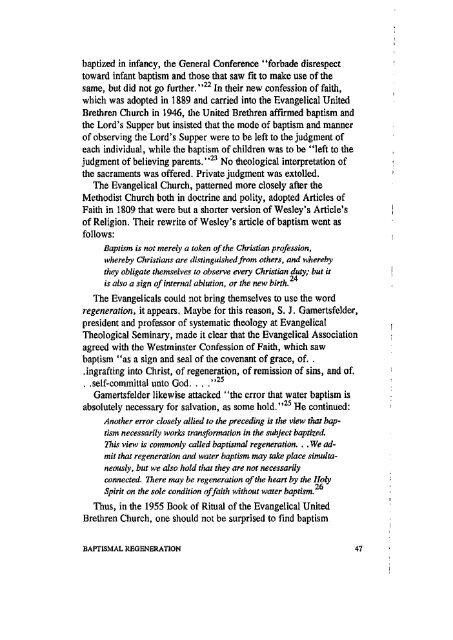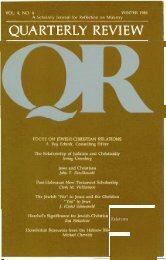TJieodore W. Jennings, Jr. The Meaning of ... - Quarterly Review
TJieodore W. Jennings, Jr. The Meaning of ... - Quarterly Review
TJieodore W. Jennings, Jr. The Meaning of ... - Quarterly Review
Create successful ePaper yourself
Turn your PDF publications into a flip-book with our unique Google optimized e-Paper software.
aptized in infancy, the General Conference "forbade disrespect<br />
toward infant baptism and those that saw fit to make use <strong>of</strong> the<br />
same, but did not go further." 22<br />
In their new confession <strong>of</strong> faith,<br />
which was adopted in 1889 and carried into the Evangelical United<br />
Brethren Church in 1946, the United Brethren affirmed baptism and<br />
the Lord's Supper but insisted that the mode <strong>of</strong> baptism and manner<br />
<strong>of</strong> observing the Lord's Supper were to be left to the judgment <strong>of</strong><br />
each individual, while the baptism <strong>of</strong> children was to be "left to the<br />
judgment <strong>of</strong> believing parents." 23<br />
No theological interpretation <strong>of</strong><br />
the sacraments was <strong>of</strong>fered. Private judgment was extolled.<br />
<strong>The</strong> Evangelical Church, patterned more closely after the<br />
Methodist Church both in doctrine and polity, adopted Articles <strong>of</strong><br />
Faith in 1809 that were but a shorter version <strong>of</strong> Wesley's Article's<br />
<strong>of</strong> Religion. <strong>The</strong>ir rewrite <strong>of</strong> Wesley's article <strong>of</strong> baptism went as<br />
follows:<br />
Baptism is not merely a token <strong>of</strong>the Christian pr<strong>of</strong>ession,<br />
whereby Christians are distinguished from others, and whereby<br />
they obligate themselves to observe every Christian duty; but it<br />
is also a sign <strong>of</strong> internal ablution, or the new birth.<br />
<strong>The</strong> Evangelicals could not bring themselves to use the word<br />
regeneration, it appears. Maybe for this reason, S. J. Gamertsfelder,<br />
president and pr<strong>of</strong>essor <strong>of</strong> systematic theology at Evangelical<br />
<strong>The</strong>ological Seminary, made it clear that the Evangelical Association<br />
agreed with the Westminster Confession <strong>of</strong> Faith, which saw<br />
baptism "as a sign and seal <strong>of</strong> the covenant <strong>of</strong> grace, <strong>of</strong>. .<br />
.ingrafting into Christ, <strong>of</strong> regeneration, <strong>of</strong> remission <strong>of</strong> sins, and <strong>of</strong>.<br />
. .self-committal unto God. . . ." 25<br />
Gamertsfelder likewise attacked "the error that water baptism is<br />
absolutely necessary for salvation, as some hold." 25<br />
He continued:<br />
Another error closely allied to the preceding is the view that baptism<br />
necessarily works transformation in the subject baptized.<br />
This view is commonly called baptismal regeneration. . . We admit<br />
that regeneration and water baptism may take place simultaneously,<br />
but we also hold that they are not necessarily<br />
connected. <strong>The</strong>re may be regeneration <strong>of</strong>the heart by the Holy<br />
Spirit on the sole condition <strong>of</strong> faith without water baptism?**<br />
Thus, in the 1955 Book <strong>of</strong> Ritual <strong>of</strong> the Evangelical United<br />
Brethren Church, one should not be surprised to find baptism<br />
BAPTISMAL REGENERATION 47












